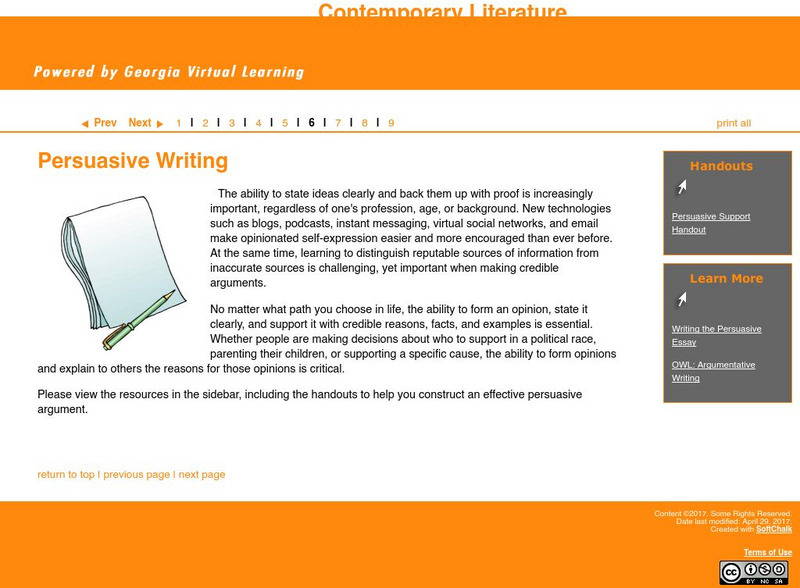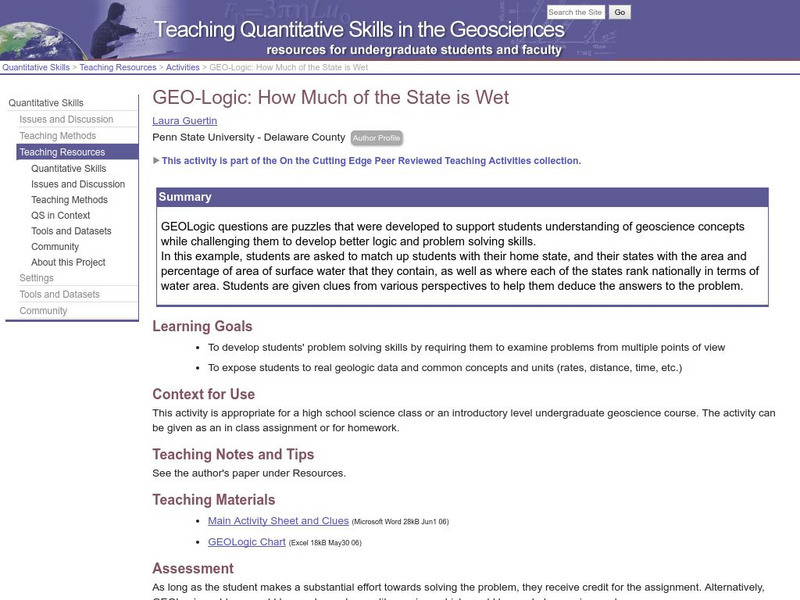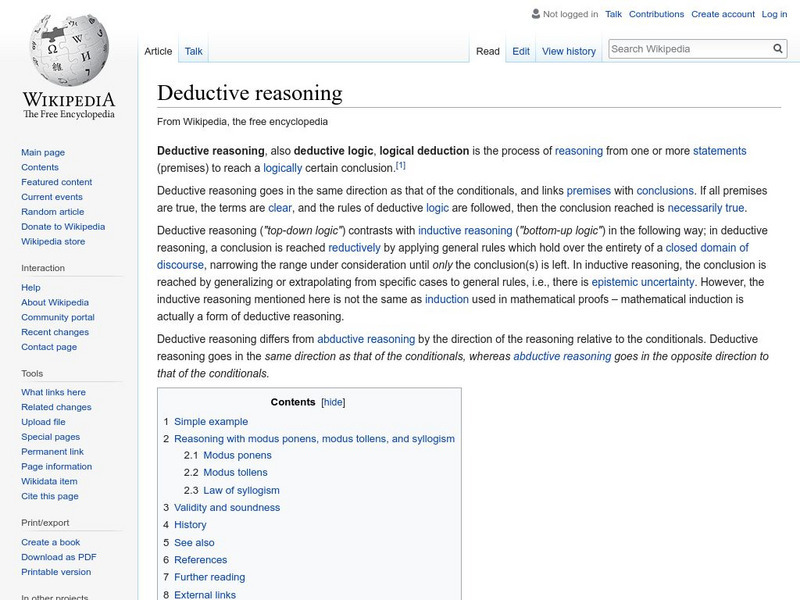Curated OER
Tennis Playing Family
In this secondary mathematics worksheet, students use logical thinking to solve a verbal problems in which they determine who is the worst tennis player in a family. The one page worksheet contains one problem with the solution.
Curated OER
Wackie Wordies-Word Puzzles
In this word puzzle worksheet, students determine the meaning of a set of 12 word puzzles. This page includes links to additional resources and an answer key.
Curated OER
Exam One Review
In this secondary mathematics activity, students solve problems that involve patterns, arithmetic and geometric sequences, geometric logic and reasoning, and changing bases. The three page activity contains fourteen problems. ...
Georgia Department of Education
Ga Virtual Learning: Rhetorical Landscape: Persuasive Writing
This lesson focuses on how to write a persuasive or argumenatative essay. It provides links to a "Persuasive Support" handout, a 7-page PDF on "Writing the Persuasive Essay," and Purdue Owl's "Argumentative Essays."
Other
Nz Maths: Problem Solving Lesson Plans: Level 3 Problems
This New Zealand Problems website is an excellent resource for lesson plans in problem-solving. They are organized into the following categories: algebra, geometry, measurement, numbers, statistics, and logic and reasoning.
Texas Education Agency
Texas Gateway: Differentiate Among Empirical, Anecdotal, and Logical Evidence
[Accessible by TX Educators. Free Registration/Login Required] In this lesson, students will learn about three types of evidence that writers often rely on: logical, empirical, and anecdotal. It will also help you distinguish among these...
Online Writing Lab at Purdue University
Purdue University Owl: Logic in Argumentative Writing
Provides a detailed explanation of the fundamentals of logic, including brief definitions of key terms and sections on fallacies and improprieties, as well as examples and practice exercises. Click on additional subtopics in the side...
Sophia Learning
Sophia: Argumentative Essays
This tutorial focuses on argumentative essays, longer writings on a well-researched topic with the writer arguing one side of the topic, free of fallacies, and providing several claims. A short YouTube clip of Monty Python shows the...
Khan Academy
Khan Academy: Conditional Reasoning and Logical Equivalence
How do we recognize logically equivalent conditional statements? Conditional (or "if-then") statements can be difficult to master, but your confidence and fluency on the LSAT will improve significantly if you can recognize the various...
University of Utah
University of Utah: History of Psychology: More on Logic
Brief overview of the definitions of 'inductive' versus 'deductive' reasoning.
Science Education Resource Center at Carleton College
Serc: Geo Logic: How Much of the State Is Wet
Using investigation and inquiry skills, students match classmates with their home state, and their states with the area and percentage of area of surface water that they contain, as well as where each of the states rank nationally in...
Wikimedia
Wikipedia: Deductive Reasoning
This free encyclopedia site from Wikipedia gives a definition and examples of deductive reasoning. It also has links to related terms and topics.
TED Talks
Ted: Ted Ed: Can You Solve the Famously Difficult Green Eyed Logic Puzzle?
One hundred green-eyed logicians have been imprisoned on an island by a mad dictator. Their only hope for freedom lies in the answer to one famously difficult logic puzzle. Can you solve it? Alex Gendler walks us through this green-eyed...
TED Talks
Ted: Ted Ed: Can You Solve the Three Gods Riddle?
You and your team have crash-landed on an ancient planet. Can you appease the three alien overlords who rule it and get your team safely home? Created by logician Raymond Smullyan, and popularized by his colleague George Boolos, this...
TED Talks
Ted: Ted Ed: Can You Solve the Temple Riddle?
Your expedition finally stands at the heart of the ancient temple. But as you study the inscriptions in the darkness, two wisps of green smoke burst forth. The walls begin to shake. The giant sandglass begins flowing with less than an...
TED Talks
Ted: Ted Ed: Can You Solve "Einstein's Riddle"?
Before he turned physics upside down, a young Albert Einstein supposedly showed off his genius by devising a complex riddle involving a stolen exotic fish and a long list of suspects. Can you resist tackling a brain teaser written by one...
TED Talks
Ted: Ted Ed: Can You Solve the Prisoner Hat Riddle?
You and nine other individuals have been captured by super-intelligent alien overlords. The aliens think humans look quite tasty, but their civilization forbids eating highly logical and cooperative beings. Unfortunately, they're not...
Web Center for Social Research Methods
Research Methods Knowledge Base: Deduction and Induction
This site provides a good explanation of deductive and inductive thinking.
Grammarly
Grammarly Handbook: Methods of Reasoning
A list (with examples) of common errors in logic including the following: non sequiturs, hasty generalization circular argument, ad hominem, ad populum, and red herring.
Biology 4 kids
Biology4 Kids: Logical Reasoning
Learn how logic and reasoning play a part in everyday thinking, and how deductive and inductive reasoning leads investigators to conclusions.
Other
Quandary Game
Applying logic and reasoning when presented with challenges, players build a futuristic society on the planet Braxos in this free online game.
Grammarly
Grammarly Handbook: Logic in Argumentative Writing
An explanation and examples of several different types of logic that can be used in argumentative writing.
Lumen Learning
Lumen: Boundless Biology: The Science of Biology
Explore the concept of scientific reasoning, and compare and contrast hypothesis and theories while understanding the difference between deductive and inductive thinking.
Lumen Learning
Lumen: Boundless Communications: Logical Appeals
This lesson plan focuses on using logical appeals in persuasive speeches including inductive and deductive reasoning, inductive reasoning and associative reasoning, forming a rational appeal, and errors in reasoning-formal and informal.






















